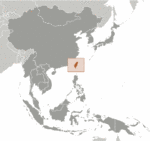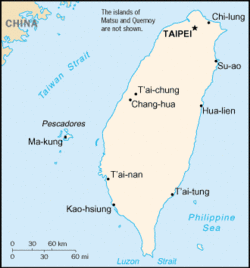Welcome to the Virtual Education Wiki ~ Open Education Wiki
Taiwan
by Paul Bacsich for Re.ViCa
For entities in Taiwan see Category:Taiwan
Partners situated in Taiwan
None.
Taiwan in a nutshell
Taiwan, more correctly called (by many but not all) the Republic of China (ROC) is a country in East Asia that has evolved from a single-party state with full global recognition into a multi-party democratic state with limited international recognition. It was a founding member of the United Nations.
Established in 1912, the Republic of China originally encompassed much of mainland China and Outer Mongolia. In 1945 at the end of World War II the Republic of China added the island groups of Taiwan and the Penghu islands to its authority. These island groups, together with Kinmen and Matsu, became the full extent of the Republic of China's authority after 1949 when the Kuomintang (KMT) lost the Chinese Civil War. The KMT lost the war to the Chinese Communist Party which then founded the People's Republic of China (PRC) in mainland China. Under ROC law, these areas currently under ROC jurisdiction are known as the "Free Area of the Republic of China."
The capital city is Taipei.
Although the jurisdiction of Republic of China only covers Taiwan and outlying islands since 1949, during the early Cold War the ROC was recognized by most Western nations and the United Nations as the sole legitimate government of China. During the 1970s, the ROC began to lose these recognitions in favor of the People's Republic of China. The Republic of China has not relinquished its claim as the legitimate government of all China. Both former Presidents Lee Teng-hui and Chen Shui-bian have held the view that it is a sovereign and independent country separate from mainland China and there is no need for a formal declaration of independence. President Ma Ying-jeou has expressed the view that the ROC is a sovereign and independent country that includes both Taiwan and mainland China, a view that corresponds with the ROC constitution and the 1992 Consensus.
From 1910s to 1940s, the Republic of China was commonly referred as "China". During the 1950s and 1960s, it was common to refer it as Nationalist China or Free China. Over subsequent decades, the Republic of China has been commonly referred to as "Taiwan". Since the late 1970s the name "China" is commonly used to refer to the People's Republic of China.
Schools in Taiwan
The educational system in Taiwan is the responsibility of the Ministry of Education. The system produces pupils with some of the highest test scores in the world, especially in mathematics and science. It has been criticised for placing excessive pressure on students and eschewing creativity in favour of rote memorization. Recent educational reforms intended to address these criticisms are a topic of intense debate in Taiwan.
Although current law mandates only nine years of schooling, 95% of students go on to high school, trade school or college.
The literacy rate in 2003 was 96.1%.
Taiwan education system
The public education system in Taiwan spans nursery schools through university. Public education has been compulsory from primary school through junior high school since 1968. In 2001 roughly 16% of the central budget was spent on education.
Access to high school and university is controlled by a series of national exams. Discipline in public schools of all levels is generally very tight with school uniforms and morning reveille being the norm. Students of all levels through high school are responsible for cleaning their own classrooms and areas around the school, cleanup time being a daily ritual. Corporal punishment is officially banned, but many reports suggest it is still practiced by many teachers, due in no small part to the fact that most parents support it.
The school year consists of two semesters. The fall semester begins in early September and runs till late January or early February. Winter vacation typically runs from two to three weeks around the Lunar New Year. Spring semester begins following the Lantern Festival in mid February and ends in early June. From middle school on, many schools hold "optional supplementary classes" during winter and summer vacation as well as after normal school hours. Despite the name, in many cases participation is compulsory. The language of instruction is Mandarin.
Higher education
There are over 100 institutions of higher education in Taiwan. Roughly 66.6% of the over 100,000 students taking the national university entrance exams are accepted to a higher educational institution. Since the 1990s many trade schools and junior colleges have been "promoted" to university status, which can account for the high university entrance rates. Nonetheless, a high score is desired as an admission creterion to the prestigious institutions.
Universities in Taiwan
Taiwan has many universities, both public and private. In light of tuition, it is less expensive in public than in private universities, like that in most western countries. Many public universities have financial support from the government for research purposes. In terms of public resources and expenses for higher education, both used to be incentives for students when they are choosing between public and private universities after their high school education.
However, some departments of the public schools are no longer better than those of private schools, as there is an imbalance in the support they receive for the school development policy. Nowadays some private schools are strongly supported by the College Council, which consists of prosperous commercial groups or religious bodies (such as Fu Jen Catholic University). Most private schools have established their own academic field in specific department or area of specialty. Presently, students will apply for the schools that have higher academic achievement in their chosen field.
Engineering is extremely popular and engineering degrees account for over a quarter of the bachelor degrees awarded in Taiwan. It is also related to future employment opportunities because of the government policy focusing on high-tech manufacturing industries.
Some of the highly regarded public universities in Taiwan include:
- National Taiwan University: The most famous and comprehensive public university in Taiwan.
- National Taiwan Normal University: Prestigious in its education, fine arts, liberal arts, music, and natural science programs. It is the leading institute in teacher training, and is best known internationally by its Mandarin Training Center.
- National Tsing Hua University: Prestigious in sciences and engineering, such as physics, chemistry, mathematics, materials science and engineering, chemical engineering, industrial engineering, nuclear engineering, also reputed in electrical engineering, computer science, linguistics and history in recent years. Had a reputation as "male-dominant" school in the past.
- National Chiao Tung University: Prestigious in electrical engineering, computer science, and management science. Neighboring the IT-driven Hsinchu Science Park. Has a long-standing rivalry with NTHU since the inception of both schools. Also had a reputation as "male-dominant" school in the past. Association to Advance Collegiate Schools of Business accredited.
- National Sun Yat-sen University: Prestigious in Oceanography, Business, Management programs. Association to Advance Collegiate Schools of Business accredited.
- National Cheng Kung University: Prestigious in engineering, medicine, science programs. One of only two universities in Taiwan that offer an aerospace engineering program.
- National Chengchi University: Famous in management and the premiere and most prestigious School of Communication in Taiwan. Association to Advance Collegiate Schools of Business accredited.
- National Central University: Famous in Center for the Space and Remote Sensing Research.
- National Chung Hsing University: Famous in agriculture and biology.
- National Taipei University: Famous in law, business, public administration and social science.
The most prestigious private university is Fu Jen Catholic University, which is famous in Foreign Languages and Literatures, Law, Business Management(Association to Advance Collegiate Schools of Business accredited), Theology, Fine Arts, Social Sciences and Communication. It is notable for having established the first graduate-level program in Conference Interpreting in Taiwan. The student body also consists of many international students.
In contrast with junior high and high school, where students are pressured by the highly selective entrance exams, college life in Taiwan is generally seen as being rather relaxed. Graduate degrees from the U.S. and Europe are also highly prized with many students applying to foreign graduate schools after completing university (though the number has declined somewhat in recent years). An average of 13000 university graduates per year choose to pursue graduate studies in the U.S.
Polytechnics in Taiwan
No information.
Education reform
The Bologna Process
There is a paper by a PhD student Shiaau-Rurng Li which "aims to explore the process of realizing the European Higher Education Area and what we can learn in order to deal with the challenges that Taiwan’s higher education will face in the future".
Administration and finance
Quality assurance
The Higher Education Evaluation and Accreditation Council of Taiwan (HEEACT) was established in December 2005. Commissioned by the Ministry, its first task was to conduct a nation-wide university program evaluation, and to set the groundwork for promoting ranking of research performance.
Beginning in 2006 and with every five years as one cycle, HEEACT will conduct evaluation on 78 comprehensive universities and their more than 2,000 programmes. In the first year, 17 universities of education, fine arts, and physical education, and on a total of 370 programs were evaluated.
For those HEIs that do not pass the evaluation for two consecutive years, the Ministry will enforce the exit mechanism and ask that program to terminate enrollment and cease to operate. The main criteria for the evaluation are: 1, aim, features and self-improvement; 2, curricula design and teaching; 3, learning and student affair; 4, research and professional performance; the performance of graduates.
Information society
Towards the information society
Information society strategy
Virtual initiatives
Interesting Virtual Campus Initiatives
- The National Open University of Taiwan (NOU) offers both degree and non-degree level courses. There were 16,300 students enrolled for the 2007-2008 academic year, studying at 14 sites around the country. Most of the university's students are distance learners between the ages of 25 and 64.
Many NOU courses cater to the elderly.
Interesting Programmes
The National Science and Technology Program for e-Learning in Taiwan is a multi-agency programme much broader than e-learning in HE, but of considerable interest.
It is a five-year programme which started in 2003. The first phase lasted from 2003 to 2007 and the National Science Council has also planned the second phase, the promotion phase (2008-2012).
There are seven operational programmes in ELNP, including: "e-learning for everyone", "narrowing the digital divide", "mobile learning devices", "internet-based industrial park for e-learning (e-learning park)", "advanced e-learning technology R&D", "fundamental research on learning and cognition in e-learning", and "policy guidance and manpower cultivation".
For more details see http://www.ifets.info/download_pdf.php?j_id=42&a_id=906.
Re.ViCa Case-study
None.
Lessons learnt
References
- Chang, M., Wang, C.-Y., & Chen, G. D. (2009). "National Program for e-Learning in Taiwan", Educational Technology & Society 12 (1), pp 5–17, available at http://www.ifets.info/download_pdf.php?j_id=42&a_id=906
- Li, Shiaau-Rurng (2005), Learning from the European Higher Education Area, http://www.knowpol.uib.no/portal/files/uplink/1291.pdf
- Chen, Dorothy (I-Ru)(2006), "Pursuing excellence: quality assurance in Taiwanese higher education", in: Proceedings of "GDPism and Risk: Challenges for Social Development and Governance in East Asia", http://www.bris.ac.uk/ceas/events/conferences/gdp/abstracts/g/papers/chen_paper.doc
For OER policies and projects in Taiwan see Taiwan/OER

